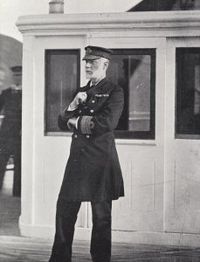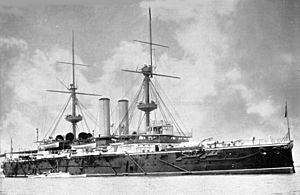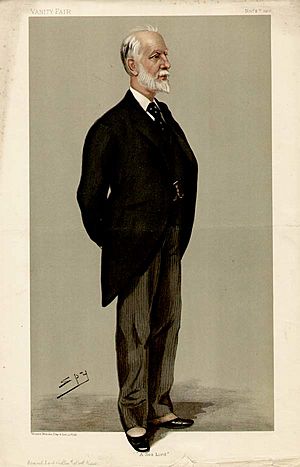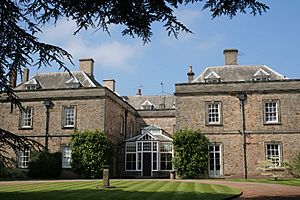Lord Walter Kerr facts for kids
Quick facts for kids
Lord Walter Kerr
|
|
|---|---|

Admiral of the Fleet Lord Walter Kerr
|
|
| Born | 28 September 1839 Newbattle Abbey, Midlothian, Scotland |
| Died | 12 May 1927 (aged 87) Melbourne Hall, Derbyshire, England |
| Allegiance | United Kingdom |
| Service/ |
Royal Navy |
| Years of service | 1853–1909 |
| Rank | Admiral of the Fleet |
| Commands held | First Naval Lord Channel Squadron Medway Steam Reserve HMS Alexandra HMS Inconstant HMS Minotaur HMS Agincourt HMS Lord Warden |
| Battles/wars | Crimean War Indian Mutiny |
| Awards | Knight Grand Cross of the Order of the Bath |
Admiral of the Fleet Lord Walter Talbot Kerr (born September 28, 1839 – died May 12, 1927) was a very important officer in the Royal Navy. He served in major conflicts like the Crimean War and the Indian Mutiny. Later, he helped Montenegro gain access to the sea. He held many top positions, including leading the Channel Squadron and the Mediterranean Fleet. Eventually, he became the First Naval Lord, the highest-ranking naval officer. In this role, he worked to make the British navy stronger.
Contents
Lord Walter Kerr was born on September 28, 1839. He was the fourth son of the Marquess of Lothian. He went to Radley College before joining the navy. In August 1853, at age 13, he became a naval cadet on HMS Prince Regent.
Adventures at Sea
Kerr saw action early in his career. He served in the Crimean War starting in March 1854. He was on HMS Neptune and later HMS Cornwallis. In August 1855, he was promoted to midshipman. He then joined HMS Shannon in August 1856.
During the Indian Mutiny, his ship's crew fought on land. Kerr was wounded near Cawnpore in December 1857. Despite his injury, he helped capture Lucknow in February 1858. He was recognized for his bravery.
Rising Through the Ranks
Kerr continued to rise in the navy. He became a lieutenant in September 1859. He served on HMS Emerald and HMS Princess Royal. While in Japan, he took some of the earliest photographs of the country. He also helped start the first rugby club there in 1866.
In April 1868, he became a commander. He was posted to HMS Hercules. He earned a medal for saving a man who fell into the River Tagus. By November 1872, he was promoted to captain. He commanded several ships, including HMS Lord Warden and HMS Alexandra.
In September 1880, Kerr oversaw an important event. He supervised the transfer of Ulcinj to Montenegro. This gave Montenegro a way to reach the sea, as agreed in the Treaty of Berlin.
Leading the Fleet
Kerr became a rear admiral in January 1889. He was second-in-command of the Mediterranean Fleet. He served on HMS Trafalgar and HMS Amphion. In August 1892, he became the Junior Naval Lord. Then, in November 1893, he became the Second Naval Lord.
In February 1895, he was promoted to vice admiral. He took command of the Channel Squadron. His flagships were HMS Royal Sovereign and HMS Majestic. He was honored with the Knight Commander of the Order of the Bath in 1896.
Kerr became the First Naval Lord in August 1899. This was a very important job. He was promoted to full admiral in March 1900. In 1902, he received another high honor, the Knight Grand Cross of the Order of the Bath.
On June 16, 1904, he became an Admiral of the Fleet. As First Naval Lord, he worked to expand the British navy. This was important because Germany was also building up its navy. He faced challenges from Admiral Sir John Fisher during this time. Fisher eventually replaced him in October 1904.
Later Life and Family
After retiring, Lord Walter Kerr was the President of the Catholic Union of Great Britain. He lived at Melbourne Hall in Derbyshire, England. He passed away there on May 12, 1927, and was buried nearby.
Kerr's Family Life
In 1873, Lord Walter Kerr married Lady Amabel Cowper. She was a writer. They had four sons and two daughters:
- Ralph Francis (1874–1932), who became a priest.
- Andrew William (1877–1929), who had children.
- Mary Catherine (1878–1957), who became a nun.
- Margaret Mary (1880–1943), who never married.
- John David (1883–1954), who had no children.
- Philip Walter (1886–1941).
 | Roy Wilkins |
 | John Lewis |
 | Linda Carol Brown |




